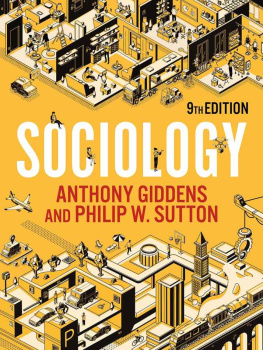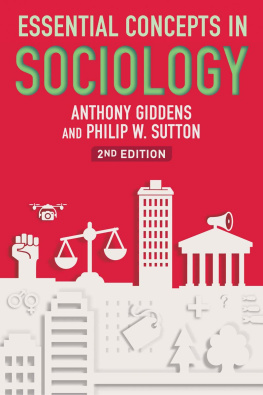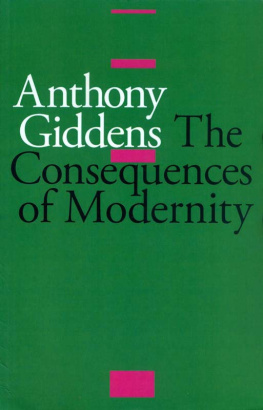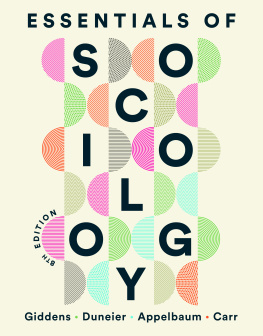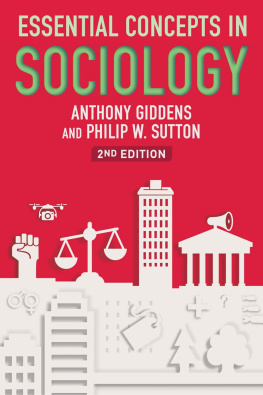Anthony Giddens - Sociology
Here you can read online Anthony Giddens - Sociology full text of the book (entire story) in english for free. Download pdf and epub, get meaning, cover and reviews about this ebook. year: 2021, publisher: Wiley, genre: Politics. Description of the work, (preface) as well as reviews are available. Best literature library LitArk.com created for fans of good reading and offers a wide selection of genres:
Romance novel
Science fiction
Adventure
Detective
Science
History
Home and family
Prose
Art
Politics
Computer
Non-fiction
Religion
Business
Children
Humor
Choose a favorite category and find really read worthwhile books. Enjoy immersion in the world of imagination, feel the emotions of the characters or learn something new for yourself, make an fascinating discovery.
- Book:Sociology
- Author:
- Publisher:Wiley
- Genre:
- Year:2021
- Rating:5 / 5
- Favourites:Add to favourites
- Your mark:
- 100
- 1
- 2
- 3
- 4
- 5
Sociology: summary, description and annotation
We offer to read an annotation, description, summary or preface (depends on what the author of the book "Sociology" wrote himself). If you haven't found the necessary information about the book — write in the comments, we will try to find it.
Sociology — read online for free the complete book (whole text) full work
Below is the text of the book, divided by pages. System saving the place of the last page read, allows you to conveniently read the book "Sociology" online for free, without having to search again every time where you left off. Put a bookmark, and you can go to the page where you finished reading at any time.
Font size:
Interval:
Bookmark:
- Chapter 1
- Chapter 2
- Chapter 3
- Chapter 4
- Chapter 5
- Chapter 6
- Chapter 7
- Chapter 8
- Chapter 9
- Chapter 10
- Chapter 11
- Chapter 13
- Chapter 14
- Chapter 15
- Chapter 16
- Chapter 17
- Chapter 18
- Chapter 19
- Chapter 20
- Chapter 22
- Chapter 2
- Chapter 3
- Chapter 4
- Chapter 6
- Chapter 8
- Chapter 9
- Chapter 22
- Chapter 1
- Chapter 2
- Chapter 3
- Chapter 4
- Chapter 5
- Chapter 6
- Chapter 7
- Chapter 8
- Chapter 9
- Chapter 10
- Chapter 11
- Chapter 12
- Chapter 13
- Chapter 14
- Chapter 15
- Chapter 16
- Chapter 17
- Chapter 18
- Chapter 19
- Chapter 20
- Chapter 21
- Chapter 22
- Chapter 1
- Chapter 3
- Chapter 4
- Chapter 5
- Chapter 6
- Chapter 7
- Chapter 8
- Chapter 9
- Chapter 10
- Chapter 11
- Chapter 12
- Chapter 13
- Chapter 14
- Chapter 15
- Chapter 16
- Chapter 17
- Chapter 18
- Chapter 19
- Chapter 20
- Chapter 21
- Chapter 22
- Chapter 3
- Chapter 4
- Chapter 5
- Chapter 6
- Chapter 7
- Chapter 8
- Chapter 9
- Chapter 10
- Chapter 12
- Chapter 13
- Chapter 14
- Chapter 15
- Chapter 16
- Chapter 17
- Chapter 19
- Chapter 20
- Chapter 21
- Chapter 22

Copyright Anthony Giddens and Philip W. Sutton 2021
The right of Anthony Giddens and Philip W. Sutton to be identified as Author of this Work has been asserted in accordance with the UK Copyright, Designs and Patents Act 1988.
First edition published in 1989 by Polity Press
This ninth edition first published in 2021 by Polity Press
Polity Press
65 Bridge Street
Cambridge CB2 1UR, UK
Polity Press
101 Station Landing
Suite 300
Medford, MA 02155, USA
All rights reserved. Except for the quotation of short passages for the purpose of criticism and review, no part of this publication may be reproduced, stored in a retrieval system or transmitted, in any form or by any means, electronic, mechanical, photocopying, recording or otherwise, without the prior permission of the publisher.
ISBN-13: 978-1-5095-3923-9
A catalogue record for this book is available from the British Library.
The publisher has used its best endeavours to ensure that the URLs for external websites referred to in this book are correct and active at the time of going to press. However, the publisher has no responsibility for the websites and can make no guarantee that a site will remain live or that the content is or will remain appropriate.
Every effort has been made to trace all copyright holders, but if any have been overlooked the publisher will be pleased to include any necessary credits in any subsequent reprint or edition.
For further information on Polity, visit our website: politybooks.com
T his ninth edition of Sociology is unique the first to be finalized while the world is in the midst of a global health pandemic, as we write this Preface in late-November 2020. Many countries, including the UK, still have an unprecedented number of restrictions in place as governments try to control the spread of a novel coronavirus and the disease it causes, labelled as Covid-19. We hope that, at the time you read this, the worst of the pandemic has passed and something approaching normal life has returned. No doubt sociologists and many others will already be making their contribution to learning the lessons from this globally disruptive crisis.
The rapid spread of Covid-19 across the world is an illustration of the global interconnectedness of the human world. Before the pandemic there were, on average, 176,000 flights every day carrying more than 4 billion people per year to every continent on Earth, for business, work, migration, tourism and family visits. There is no global government, but todays world certainly feels smaller and more accessible, and it is increasingly experienced as one single human community. The optimistic advice to all new graduates, the worlds your oyster, becomes more accurate every year.
Yet such fabulous opportunities do not come risk-free. The aviation industry contributes to global warming and uses huge amounts of non-sustainable fossil fuels at a time when global warming is widely accepted as the most serious threat to the long-term future of human societies. How do we balance the opportunities and risks inherent in our love of and need for international travel? Aviation is just one example of the high-risk, high-opportunity world that human beings have created. Similarly, we are in the midst of an ongoing digital revolution that connects people together systematically and continuously, offering unprecedented opportunities for communication and networking. But, at the same time, the digital environment brings new possibilities for tracking, surveillance and data gathering that states and corporations use to delve ever deeper into the lives and lifestyles of individuals. Should we accept that forfeiting privacy is necessary in order to reap the benefits of the digital age? Sociological research and theorizing can help us all to think through these questions.
Sociology demands that we learn to set aside our personal beliefs and opinions during our work. In this way, learning how to think sociologically is a profound intellectual and emotional challenge that can be unsettling, though most students and professional sociologists say they have been changed, for the better, by the experience. The discipline also forces us to look beyond the immediate context of our individual lives to see our society in a new light, as we reach a deeper understanding of the causes and consequences of our own, and other peoples, actions. It also takes us into the ways of life in very different societies, broadening our understanding of the human experience around the world. We invite you to take the first steps on that journey.
R esearching, writing and producing this book involves a creative collective of people, not just two authors. The customary caveat applies, however: all errors remain the responsibility of the authors. First thanks must go to all of those who reviewed the twenty-two chapters. Yet again, their critical, constructive comments have been an invaluable source of expert knowledge which helps to keep the book at the forefront of contemporary research and theory. We also thank the many lecturers and student readers of the previous edition, people who actually use the book and tell us about their experience and suggest possible improvements. It often seems that the book mediates between cutting-edge research and the teaching and learning process, which is exactly how it should be.
As ever, the Polity staff made the production process relatively painless. Special mention must go to Neil de Cort, Sarah Dobson and Breffni OConnor, who took the book through production. We are very grateful for the painstaking work of Caroline Richmond, who never tires of pointing out our mistakes and inconsistencies, and always with good humour. As ever, our thanks to Jonathan Skerrett for his sound advice and good judgement on the big decisions. Finally, we thank Pat Sutton for more or less everything.
Font size:
Interval:
Bookmark:
Similar books «Sociology»
Look at similar books to Sociology. We have selected literature similar in name and meaning in the hope of providing readers with more options to find new, interesting, not yet read works.
Discussion, reviews of the book Sociology and just readers' own opinions. Leave your comments, write what you think about the work, its meaning or the main characters. Specify what exactly you liked and what you didn't like, and why you think so.

